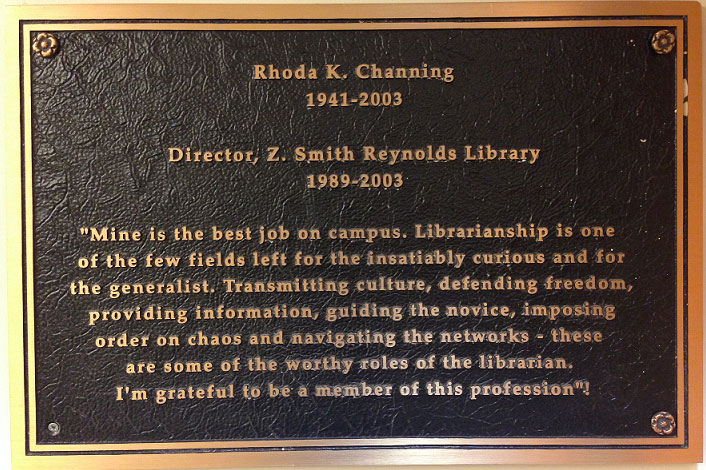This article is more than 5 years old.
Robert “Tripp” Maloney has been a student assistant with the Access Services department at ZSR since he was a first year student. I was pleased to see that he’d won the opportunity to speak at the 2016 Founder’s Day Convocation where exceptional seniors have an opportunity to reflect on their tenure as students of “Mother so Dear.” His oration, entitled “The Case for Generalism” speaks strongly of his belief that, while specialization has a part to play as we travel the path on our own particular road, that we should all hold out some opportunity to trip over the interesting parallels and insights that come of remaining, at least in some measure, a generalist. When I approached Tripp after the oration to offer my congratulations on his success, he told me that his inspiration for that speech came from his many hours working at the Welcome Desk in ZSR, and noting what was written by Dr. Rhoda K. Channing on the plaque outside of Starbucks. In this guest post, he elaborates on his perspective and shares the inspiration behind his Senior Oration, “The Case for Generalism”.
Having received the honor and the opportunity to present a senior oration this year, I feel like I would be remiss without acknowledging one of its most direct influences: my time at ZSR Library. More specifically, I mean the time I spent working at the welcome desk, during those early hours when there wasn’t much to do other than sit and evaluate my surroundings.
Perhaps not my very first day at that job, but very early on, I noticed a plaque across the room, right next to the entrance to Starbucks. Some of you may know it, and I imagine that the majority of Wake Foresters have at least seen it, although stopping to read it during Starbucks peak hours would be out of the question.

The plaque is dedicated to Dr. Rhoda K. Channing, and contains a quote from her about what makes a library so wonderful. Dr. Channing calls a library “the last haven of the generalist”, a description that may resonate with those of you who have read my oration. It certainly resonated with me: during those slack hours, when the only interesting thing in the room is that plaque, I began to think about Dr. Channing’s message. Fresh from high school, I was apprehensive of the specter of the future and the necessity of specializing and joining the job hunt. The idea of delaying this future appealed to me greatly at the time, and a look at my schedule during the beginning of my time would reflect that: my schedule meandered around, showing some affinity for languages, but mostly just an indistinct hubbub of courses.
Eventually, though, I had to grow up and form a vision. My schedule now reflects more direction – Spanish major, with minors in German, Linguistics, and Latin American and Latino Studies. I still work at the library, but almost exclusively in stacks, so those hours spent staring at Dr. Channing’s words are over. However, the quote has continued to run through my head for the three intervening years. And, of course, living with that idea for years has led to me questioning it. Is there only one recourse for the generalist? This question provided the germ for the oration I wrote, combined with some other observations from my time here. I won’t quote myself, but to summarize: the conclusion I reach is that generalism is a somewhat broader concept, and, if treated as a state of mind, is accessible for any educated person. I don’t disagree with Dr. Channing, but I have managed to assuage my younger self’s fear of the future. It’s not a matter of choosing to be a generalist or choosing to specialize. We are smart enough to do both, so why not?
1 Comment on ‘Inspiring “The Case for Generalism”’
I really enjoyed your post! That quote made an impression on me when I fist came to ZSR to work for Rhoda Channing. It was my first academic library position and her embrace of the generalist gave me confidence not to become overwhelmed while I learned about how things work at universities.